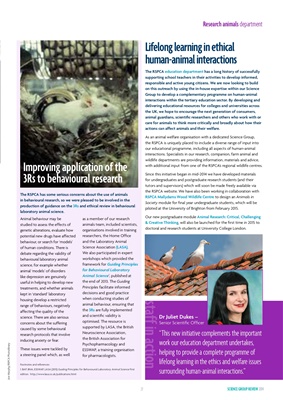
21 SCIENCE GROUP REVIEW 2014
Research animals department
Dr Juliet Dukes -
Senior Scientific Officer
"This new initiative complements the important
work our education department undertakes,
helping to provide a complete programme of
lifelong learning in the ethics and welfare issues
surrounding human-animal interactions."
staff in action
Improving application of the
3Rs to behavioural research
The RSPCA has some serious concerns about the use of animals
in behavioural research, so we were pleased to be involved in the
production of guidance on the 3Rs and ethical review in behavioural
laboratory animal science.
Animal behaviour may be
studied to assess the effects of
genetic alterations, evaluate how
potential new drugs have affected
behaviour, or search for 'models'
of human conditions. There is
debate regarding the validity of
behavioural laboratory animal
science, for example whether
animal 'models' of disorders
like depression are genuinely
useful in helping to develop new
treatments, and whether animals
kept in 'standard' laboratory
housing develop a restricted
range of behaviours, negatively
affecting the quality of the
science. There are also serious
concerns about the suffering
caused by some behavioural
research protocols that involve
inducing anxiety or fear.
These issues were tackled by
a steering panel which, as well
as a member of our research
animals team, included scientists,
organisations involved in training
researchers, the Home Office
and the Laboratory Animal
Science Association (LASA).
We also participated in expert
workshops which provided the
framework for Guiding Principles
for Behavioural Laboratory
Animal Science1, published at
the end of 2013. The Guiding
Principles facilitate informed
decisions and good practice
when conducting studies of
animal behaviour, ensuring that
the 3Rs are fully implemented
and scientific validity is
optimised. The resource is
supported by LASA, the British
Neuroscience Association,
the British Association for
Psychopharmacology and
ESSWAP, a training organisation
for pharmacologists.
Footnotes and references:
1. BAP, BNA, ESSWAP, LASA (2013) Guiding Principles for Behavioural Laboratory Animal Science First
edition. http://www.lasa.co.uk/publications.html
Lifelong learning in ethical
human-animal interactions
The RSPCA education department has a long history of successfully
supporting school teachers in their activities to develop informed,
responsible and active young citizens. We are now looking to build
on this outreach by using the in-house expertise within our Science
Group to develop a complementary programme on human-animal
interactions within the tertiary education sector. By developing and
delivering educational resources for colleges and universities across
the UK, we hope to encourage the next generation of consumers,
animal guardians, scientific researchers and others who work with or
care for animals to think more critically and broadly about how their
actions can affect animals and their welfare.
As an animal welfare organisation with a dedicated Science Group,
the RSPCA is uniquely placed to include a diverse range of input into
our educational programme, including all aspects of human-animal
interactions. Specialists in our research, companion, farm animal and
wildlife departments are providing information, materials and advice,
with additional input from one of the RSPCA's regional wildlife centres.
Since this initiative began in mid-2014 we have developed materials
for undergraduates and postgraduate research students (and their
tutors and supervisors) which will soon be made freely available via
the RSPCA website. We have also been working in collaboration with
RSPCA Mallydams Wood Wildlife Centre to design an Animals in
Society module for final year undergraduate students, which will be
piloted at the University of Brighton from February 2015.
Our new postgraduate module Animal Research: Critical, Challenging
& Creative Thinking, will also be launched for the first time in 2015 to
doctoral and research students at University College London.
Joe Murphy/RSPCA Photolibrary